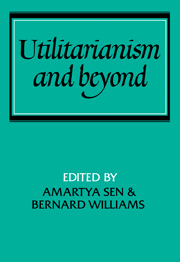Book contents
- Frontmatter
- Contents
- Preface
- Introduction: Utilitarianism and beyond
- 1 Ethical theory and utilitarianism
- 2 Morality and the theory of rational behaviour
- 3 The economic uses of utilitarianism
- 4 Utilitarianism, uncertainty and information
- 5 Contractualism and utilitarianism
- 6 The diversity of goods
- 7 Morality and convention
- 8 Social unity and primary goods
- 9 On some difficulties of the utilitarian economist
- 10 Utilitarianism, information and rights
- 11 Sour grapes – utilitarianism and the genesis of wants
- 12 Liberty and welfare
- 13 Under which descriptions?
- 14 What's the use of going to school?
- Bibliography
6 - The diversity of goods
Published online by Cambridge University Press: 30 January 2010
- Frontmatter
- Contents
- Preface
- Introduction: Utilitarianism and beyond
- 1 Ethical theory and utilitarianism
- 2 Morality and the theory of rational behaviour
- 3 The economic uses of utilitarianism
- 4 Utilitarianism, uncertainty and information
- 5 Contractualism and utilitarianism
- 6 The diversity of goods
- 7 Morality and convention
- 8 Social unity and primary goods
- 9 On some difficulties of the utilitarian economist
- 10 Utilitarianism, information and rights
- 11 Sour grapes – utilitarianism and the genesis of wants
- 12 Liberty and welfare
- 13 Under which descriptions?
- 14 What's the use of going to school?
- Bibliography
Summary
What did utilitarianism have going for it? A lot of things undoubtedly: its seeming compatibility with scientific thought; its this-wordly humanist focus, its concern with suffering. But one of the powerful background factors behind much of this appeal was epistemological. A utilitarian ethic seemed to be able to fit the canons of rational validation as these were understood in the intellectual culture nourished by the epistemological revolution of the seventeenth century and the scientific outlook which partly sprang from it.
In the utilitarian perspective, one validated an ethical position by hard evidence. You count the consequences for human happiness of one or another course, and you go with the one with the highest favourable total. What counts as human happiness was thought to be something conceptually unproblematic, a scientifically establishable domain of facts like others. One could abandon all the metaphysical or theological factors – commands of God, natural rights, virtues – which made ethical questions scientifically undecidable. Bluntly, we could calculate.
Ultimately, I should like to argue that this is but another example of the baleful effect of the classical epistemological model, common to Cartesians and empiricists, which has had such a distorting effect on the theoretical self-understanding of moderns. This is something which is above all visible in the sciences of man, but I think it has wreaked as great havoc in ethical theory.
The distortive effect comes in that we tend to start formulating our meta-theory of a given domain with an already formed model of valid reasoning, all the more dogmatically held because we are oblivious to the alternatives.
- Type
- Chapter
- Information
- Utilitarianism and Beyond , pp. 129 - 144Publisher: Cambridge University PressPrint publication year: 1982
- 31
- Cited by



